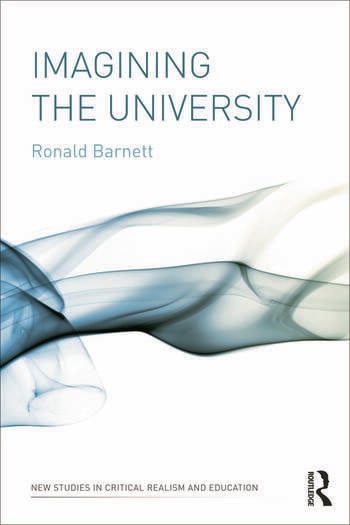
Ideas of the university in the public domain are hopelessly impoverished. 'Impoverished' because they are unduly confined to a small range of possible conceptions of the university; and 'hopelessly' because they are too often without hope, taking the form of either hand-wringing over the current state of the university or merely offering a defence of the emerging nature of 'the entrepreneurial university'....
Why does this matter, and why does it matter at this particular time? At the very moment when the idea of the university should be opening out, it seems to be closing in, at least in the public imagination. The idea of the university has, of course, undergone many shifts and been subject to varying conceptions over time. For some hundreds of years, the idea of the university was - as it might be said - that of the metaphysical university, reflective of inquiry that enhanced humanity's connections with God, or the Universe, or Truth, or Spirit, or even the State. That conception gave way to the research university, which is now giving way to that of the entrepreneurial university, which in turn is closely allied to the emergence of a tacit idea of the corporate university.
What is striking about this conceptual journey that the idea of the university has undergone - over nearly one thousand years - is that it has gradually shrunk. Whereas the metaphysical university was associated with the largest themes of humanity's self-understanding and relationships with the world, the idea of the university has increasingly - and now especially in its entrepreneurial and corporate incarnations - closed in. The entrepreneurial university is expected to fend for itself, and attend to its potential impact on particular segments of the economy, and become distinctive. This university has abandoned any pretence to be associated with universal themes.
The idea of the university has closed in ideologically, spatially and ethically. ideologically, the contemporary envelope of ideas encourages the university to pursue quite narrow interests, particularly those of money (in the service of a national - or even a global - knowledge economy); spatially, the university is enjoined to engage its region, especially with industrial or business organizations in its environs (increasingly its students are also 'local'); and ethically, the university has become focused on its own interests. It will, as a result, close departments of chemistry or physics or modern languages or philosophy because it sees such closures as serving its own (usually financial) interests rather than their being laced in a set of public interests. (pp1-2)
Barnett argues that "imaginative ideas of the university are in short supply and that there are - if only embryonically - many ideas of the university close at hand." He claims that the powers that be resist opening it up to alternative ideas. While his aim is specific to the idea of the university, I find his insights into the usefulness of imagination and and the birthing of new ideas particularly compelling. In fact the need to use his approach for rethinking our economic and political systems in the face of globally shared dilemmas seems perhaps even more essential at the moment.
As I wind myself through this book I will be endeavoring to find some recipes for helping us 'think outside of the box' - how to create the conditions that allow us to do this together in communities. It is pretty clear to me that if we wait for universities to lead, especially given Barnett's observations above, we will fail to avert the pain of a combined unraveling of ecological and human systems.
As the name of this blog implies, let us join with Barnett is seeking positive possibilities with due diligence that we might arrive at a feasible utopia together.

No comments:
Post a Comment